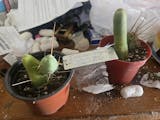If you are looking for Agaves for sale , Click HERE , or type agave in the search bar above and it will direct you to potted agaves and agave pups etc.
We have well over 20 types of agaves available in a variety of different size containers, and we're always adding new ones to our site! Agaves are great in decorative containers standing alone, or added to your landscape for their size, colors and textures! We can customize size and quantity as well. If you are looking for a specific type/s, just email us and we’ll let you know, chances are if we don’t have it, we can find it!
Here’s some basic Agave info from http://succulent-plant.com/families/agavaceae.html
Agave – Linnaeus (1753)
Greek: agauos = of kings and heros, illustrious, hence noble
Over 300 species of Agave have been described, but only about 200 are currently recognised. Most species are monocarpic, although a few can flower several times during their life. The flowers are “perfect” with both male and female parts. Many species of Agave are bat pollinated and produce musky perfumes as attractants. Others produce sweeter odours to attract insects.
Most Agaves consist of rosettes of thick, hard, rigid but succulent leaves often with marginal teeth and usually with a lethally sharp terminal spine. Prolific vegetative growth and offsetting at the base of the plant or through stolons, usually maintains a clump of plants thus compensating for loss of flowering rosettes. A few species remain solitary, relying on seed production for survival of the species.
The interior of the leaves contains longitudinal fibres representing the vascular system. Agave leaf fibre was used by native Americans. Agave fibre from a range of species is of commercial importance, with the best quality fibre coming from the youngest leaves. Sisal (hemp) made from cultivated Agave sisalana is used to make clothing and rugs.
Carbohydrates stored in the core of several species of Agave were fermented by native Americans to make a beverage called pulque which was used in religious ceremonies. Distillation of a similar ferment made from the developing Agave flower bud is the basis for modern production of Mezcal. Only if made from the Blue Agave within Tequila, Mexico can the distillate be called Tequila.

